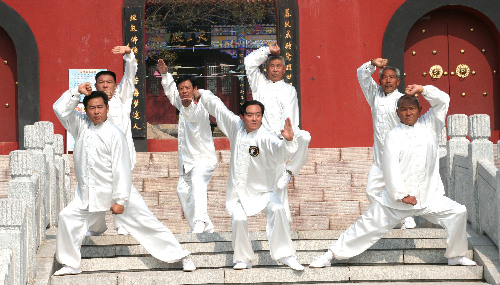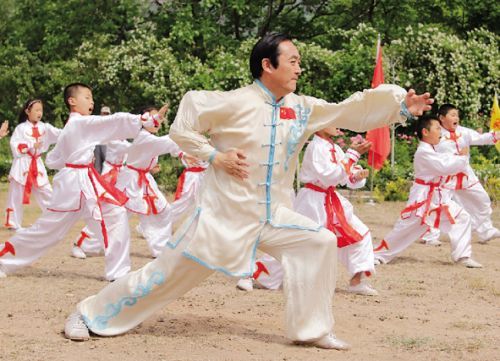Xujiaquan (Xu family martial arts)
During the reign of Emperor Yongzheng of Qing Dynasty (1644-1911), Xu family martial arts originated in Tongji village of Xintai city in Tai'an, Shandong province.
Over 280 years, Xu's Kung Fu formed systematic performance steps combining the essence of two major Chinese kung fu schools - Shaolin and Wudang - with local folk features.
Its unique performance displays the local personality of steadiness and candidness.
Xu family kung fu consists of Chinese boxing, swordsmanship, other weapon styles and military training. The martial art plays a crucial role for defense against invasion and for building up the health of locals.
Xu's martial art has gained a following in other cities throughout Shandong province, and other provinces in China, including Jiangsu, Henan, Yunnan and in the country's capital of Beijing.
 |
|
Xu Qinqi (M), the 10th successor of the family’s martial art, performs with his compatriots. [Photo/tawh.gov.cn] |
Xu Shengcai (1725-1797) created the earliest form of the family's kung fu during the reign of Emperor Yongzheng of the Qing Dynasty (1644-1911).
After a hundred years of development, the sixth successor of the family, Xu Huating (1826-1900), popularized the martial art during the defense of the village against the army from the Taiping (Heavenly Kingdom) Rebellion in 1851-1864. From that time, Xu's kung fu began to be taught to those who were not the family members.
 |
|
Xu Qinqi, the 10th successor of the family’s martial art, gives free lessons to local children interested in kung fu. [Photo/sd.dzwww.com] |

 Shandong: Where Excellence is made
Shandong: Where Excellence is made Building a Moderately Prosperous Society: The Tai'an Way
Building a Moderately Prosperous Society: The Tai'an Way Video: Jiunvfeng Park
Video: Jiunvfeng Park

